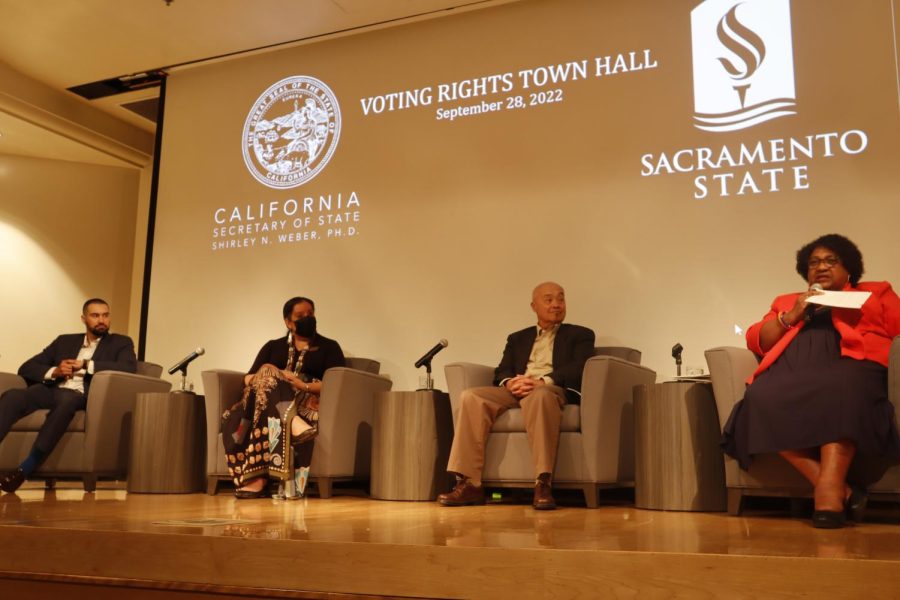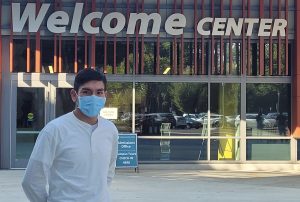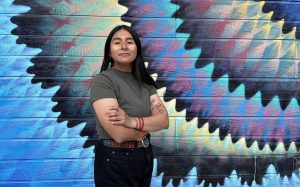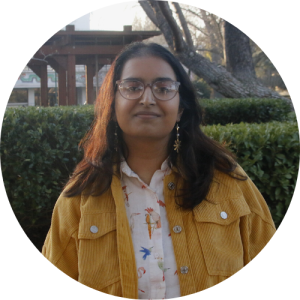Secretary of State educates students on voter suppression
Shirley Weber and doctoral panel discuss voting responsibility
(L-R) Christopher Towler, Rose Soza War Soldier, Timothy Fong and Secretary of State Shirley Weber were sitting in Hinde Auditorium on Sept. 28, 2022 during the Voting Rights Town Hall. The panel discussed topics such as the history of voting and the importance of understanding voting as not only a right, but a responsibility.
September 29, 2022
California Secretary of State Shirley Weber spoke at the Voting Rights Town Hall in the Hinde Auditorium at Sacramento State on Wednesday to discuss the protection of voting rights.
Weber spoke as a panel member alongside ethnic studies professors Rose Soza War Soldier, Christopher Towler and Timothy Fong. Associated Students, Inc. (ASI) President Salma Pacheco acted as the moderator.
The panel spoke on the dangers of voter suppression threatening America today and urged students to register to vote.
“The act of vote is a powerful act,” Weber said. “It is the only real power that you have to change the system. And it’s the equalizing system.”
The panel highlighted the importance of the Voting Act of 1965, a piece of legislation that prevented racialized voting suppression through tactics such as poll taxes or literacy tests.
The law had been continually renewed until 2013 when the Supreme Court stated that it had to be reevaluated. The absence of this act led to increased legislation preventing certain groups of people from voting.
“It’s taken 200 years to get to this point where we actually look like the democracy that our founders said we should be,” Towler said. “It’s taken us centuries to get here but this could very quickly be undone and we can very quickly be pushed back to a time where our democracy looks far more limited and far more undemocratic.”
According to War Soldier, evidence of targeted voter suppression can be seen in groups such as Native Americans. An example she gave was the Voter ID Law passed in Arizona, which excludes Native people who may not have access to qualifiers such as property tax information or car registration.
Native Americans’ ability to vote is affected because, in certain states, the Native vote is the swing vote, according to the panel.
“They’re targeting multiple populations in that state but they are also very much going after the Native right to vote,” said War Soldier. “Once you understand that history, you understand the trajectory of the Native right to vote.”
The importance of learning about America’s voting history was stressed during the town hall. Weber said she often speaks to young people who forget how legislation has changed to become more inclusive.
The history of Asian Americans’ right to vote, which was obtained after World War II, impacts the Asian vote in our present, according to Fong.
“The right to vote for Asian Americans in the United States is relatively late compared to other groups,” Fong said, adding that this contributes to the low voter participation rate.
The panel said that the ability to vote was not only a right, but a responsibility.
“There are things that we talked about that we took for granted,” Fong said. “Rights that we thought we earned may not even exist. They’re human-created. They can be human taken away unless we challenge them.”
However, Weber said that California has strong protections to prevent suppression from happening and zero tolerance for any attempts to deny people the right to vote.
“We have some strong laws and some strong protection, but keep in mind, we are part of the United States of America,” said Weber. “When other law other states start denying people the right to vote — when they start messing with the voting process and who gets elected and who does not — that affects us.”
Students in attendance said that they believed in the importance of voting. Third-year English and health sciences major Marquis La Shon found the town hall useful.
During the forum, La Shon asked about finding credible and simple information on voting during the event. Weber responded, saying that students should look at their voter information guides.
“I feel like the information they gave was very informative and actually did a lot to help you understand why it’s important to vote and how that can be helpful in changing how things are in the U.S.” La Shon said.
Sac State students can also find information on this upcoming election through our student voter guide or on the Secretary of State’s website.
Students can vote for this upcoming election at the Welcome Center starting from Nov. 5 – 7 from 8 a.m. – 4 p.m. and Tuesday, Nov. 8 from 7 a.m. – 8 p.m., according to the Sac State website.



































































































































